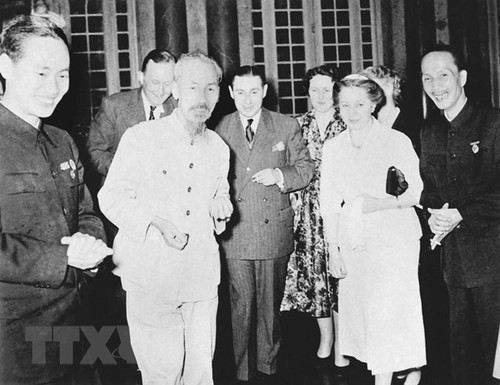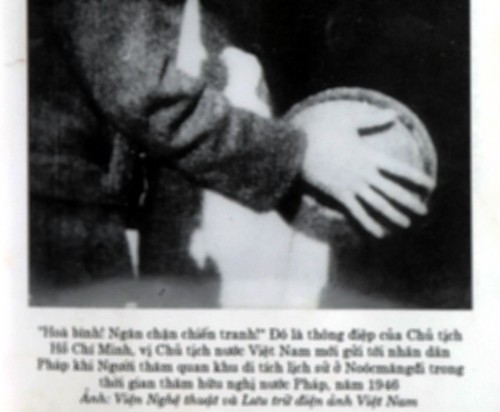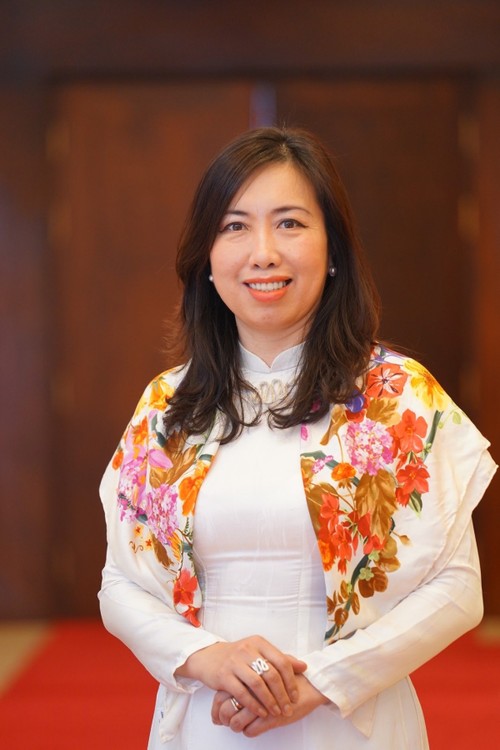 President Ho Chi Minh receives a French peace movement delegation during their visit to Vietnam, March 15, 1955. (Photo: Archive/ VNA) President Ho Chi Minh receives a French peace movement delegation during their visit to Vietnam, March 15, 1955. (Photo: Archive/ VNA) |
The Ballad of Ho Chi Minh, penned by British singer-songwriter Ewan MacColl in 1954, quickly became popular among nations espousing peace. This ballad, describing President Ho's journey for national salvation, earned numerous invitations to grace the stage at the International Protest Song gathering in Havana, Cuba, in 1967. The song has been translated into numerous languages and sung in many countries.
Under observers’ point of view, President Ho Chi Minh placed peace at the forefront, considering war a last resort. Back in the 1950s, he consistently dispatched letters to the French administration, citizens, as well as to governments, activists, and people across various nations to oppose the French ruling in Vietnam and advocate for peaceful negotiations.
 President Ho places his hand atop the barrel of a cannon during his visit to the historic site Normand in 1946. (Photo: NDO) President Ho places his hand atop the barrel of a cannon during his visit to the historic site Normand in 1946. (Photo: NDO) |
As a gesture of goodwill, President Ho Chi Minh accepted an invitation to visit France in 1946. Throughout his visit, he engaged with the press, ministers, and French military leaders. During a visit to the historic site Normandy, he placed his hand atop the barrel of a cannon, symbolizing the resolute spirit of "Preserve the peace! Halt the war!"
During an interview with reporter Bernard Dranber from the Paris-Saigon Newspaper on December 13, 1946, President Ho Chi Minh firmly stated, "I and my fellow countrymen genuinely yearn for peace. War isn't what we're after. I'm well aware that the French people share this sentiment against war. We're absolutely determined to avert this war through every possible avenue."
Professor Dr. Hoang Chi Bao, who has dedicated his life to delving into the philosophical tenets of President Ho Chi Minh, said that embedded within Ho Chi Minh's diplomatic mindset is a clear differentiation between friends and opponents. He opposed and aimed to defeat the invading French military while expressing his deep respect for the French people and deeming the French civilization an embodiment of human values, he said.
"Among his circle of French acquaintances, even those who held different perspectives, President Ho was adept at recognizing commonalities that bound them together," Bao added.
Ho Chi Minh's perspective was that when Vietnamese people achieved independence, it extended beyond just their own nation. He believed that their freedom held a universal significance, symbolizing the liberation of all peoples worldwide.
 Deputy Foreign Minister Le Thi Thu Hang (Photo: VOV) Deputy Foreign Minister Le Thi Thu Hang (Photo: VOV) |
Deputy Foreign Minister Le Thi Thu Hang said Ho Chi Minh Thought embodies a comprehensive framework encompassing both practical application and theoretical principles. It possesses not only ideological importance but also holds enduring global relevance, she said, adding that these values have endured through time, representing an ethical conduct and forward-thinking philosophy that UNESCO continues to uphold to this very day.
President Ho Chi Minh's dedication to peace wasn't limited to just that – he also deeply valued friendship and unity among all nations. When asked by an Indian journalist in May 1947, he made his stance clear: "Vietnam's approach to Asian nations is one of brotherhood, while our approach to the five powers is one of friendship." He also stressed Vietnam’s foreign policy aimed to maintain friendly relations with all neighboring countries.
Chintamani Mahapatra, Principal of India’s Jawanari Neru University, said, "During his visit to India, he went to many places- factories, industries, and farmland. He was greeted by people as well as leaders of India. He was an influential individual in India and a darling to Indian people."
Across the more than 50 countries he visited, President Ho Chi Minh fostered friendship and peace. The resonance of President Ho Chi Minh's influence spans far and wide: numerous monuments and memorials have been erected in his honor, and his name graces countless roads, avenues, and educational institutions across the globe.